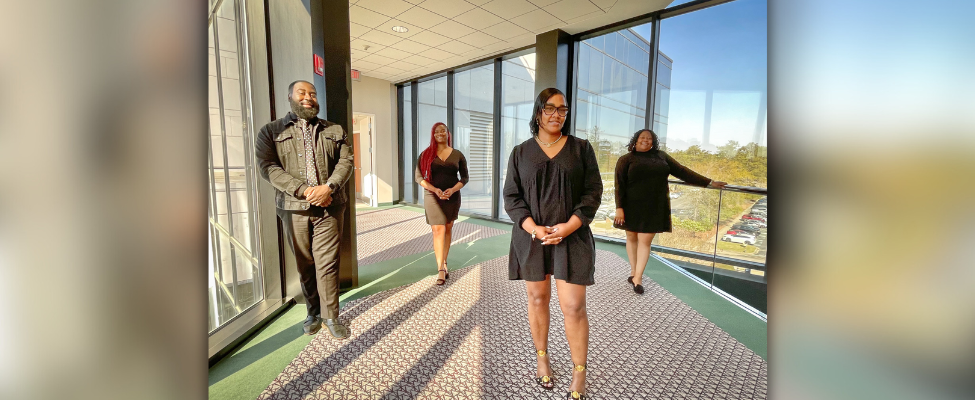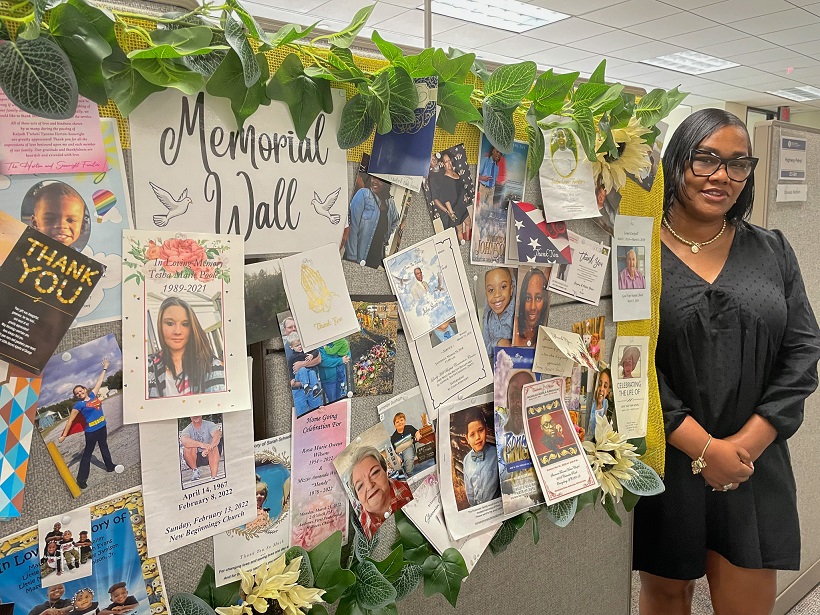
On a shelf in Crystal Salley’s office sits a candle decorated with a photo of four smiling children — all siblings, and all of them killed in a traffic collision years ago. The heartbreaking image is a daily reminder to Salley of the importance of her work in the South Carolina Highway Patrol’s Victim Services Unit.
“You meet people in their most vulnerable state, when they are their most broken,” Salley said. “You have to be strong enough not only for them, but for yourself so you can be their voice, because oftentimes they don’t have one.”
Salley and her team of three advocates serve victims of traffic crimes categorized by state law as violent offenses, including felony DUI and reckless driving.
“A traffic collision can turn someone’s life upside down, whether they were seriously injured or lost someone they love,” Salley said. “Those first 48 hours are critical in what happens next. It changes so quickly because everyone’s needs are different.”
There was only one advocate when the unit was created in the 1990s. After Salley arrived in 2016, the only other advocate left, and Salley was left to cover the entire state alone for two years.
“Over a four-year time frame, we started adding more advocates when the education started to grow. We realized we weren’t meeting all the needs of the victims we served,” Salley said. “We couldn’t do anything about the past, but we can change going forward.”
Each advocate is assigned a different geographical region of the state. A typical day could have an advocate going from the hospital where a victim was just brought into the emergency room, to a court hearing with the family of a deceased victim from another collision, to a salvage yard to retrieve a victim’s belongings from a mangled car. The number of cases an advocate has at a given time varies, but the unit is busier during the summer. Last year, the unit served nearly 12,000 victims, and this year is on track to surpass that.
“We not only educate, but build a rapport with the victims, because they remember the person who helped them in a time of need,” Salley said. “Victims want justice right away (after a collision), but that’s not how it works. They need to be educated on the adjudication process, so it’s important that we explain those processes to them.”
Sometimes, their hands are tied by the law because a crime was not considered violent, Salley said. In those cases, they work with the South Carolina Troopers Association to leverage partnerships and donations. This could be donating a refurbished car to a family whose mother was the victim in a deadly hit-and-run, or purchasing a drum set for a young autistic boy whose parent was killed in a collision.
The unit makes an impact on victims and the community in positive and lighthearted ways, such as the “Shop with a Cop” initiative at Christmas time for children affected by fatal collisions that year, and through a partnership with the Roc Solid Foundation, during which victim advocates and troopers build playground sets for children in need. All thanks to generous donations made to the SC Troopers Association.
National Crime Victims’ Rights Week, which runs from April 6-12, is an opportunity to highlight these dedicated professionals, how they help those that have suffered, and the reason why their work continues.
Salley wishes they could do more to help. But sometimes, they can only offer their sympathies.
“Some days I go home and I feel like I’m on top of the world,” she said. “And the next day I feel like the world is on top of me. It’s hard to talk to a mom who just lost her children in a collision, and then I go home and I still have my children. That’s difficult to do.”
Yet, the group tirelessly continues to do the hard work, knowing how important it is to be there for the victims and their families, even when they feel what they can do isn’t enough.
The candle in Salley’s office is a powerful symbol of not only perseverance during difficult times, but also forgiveness. The father of the four children in the picture was driving intoxicated in the crash that killed three of them and left the fourth brain-dead. The grief-stricken mother had a request of Salley that left her floored: She wanted their father to have a chance to say goodbye to their little girl before she was taken off life support.
“I thought about it and I prayed about it, and at the end of the day, my job is to serve the victim,” Salley said. “She reminded me that he lost his children too. He didn’t wake up that morning with the intention of that being their last day.”
Salley and her staff still receive cards from the mom, as well as other families of victims who died in collisions. The cards, photos, and messages of thanks all go on a bulletin board in the Victim Services Unit’s office area.
“It’s a reminder for why we’re doing what we’re doing,” she said. “It’s not about me or us, it’s about them. They make you a part of their family, and it helps to know we make some sort of an impact.”

